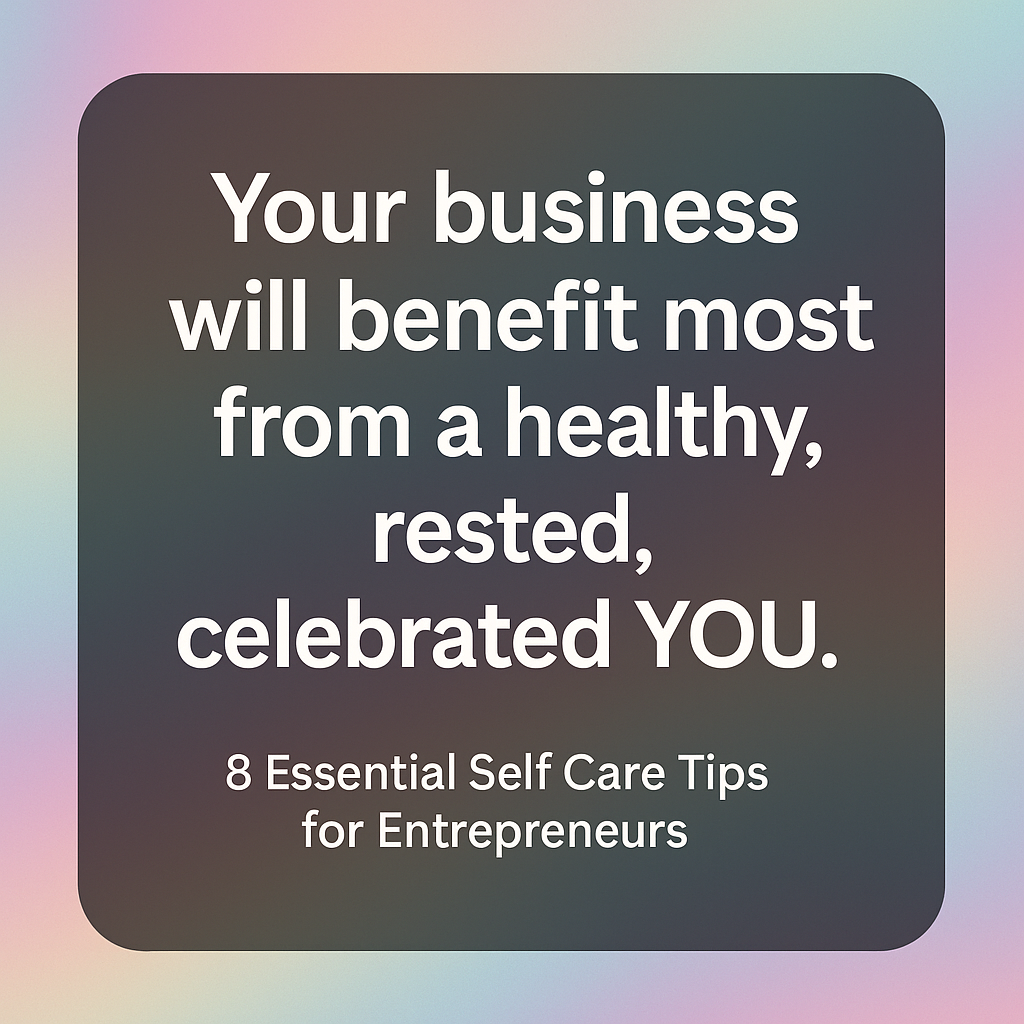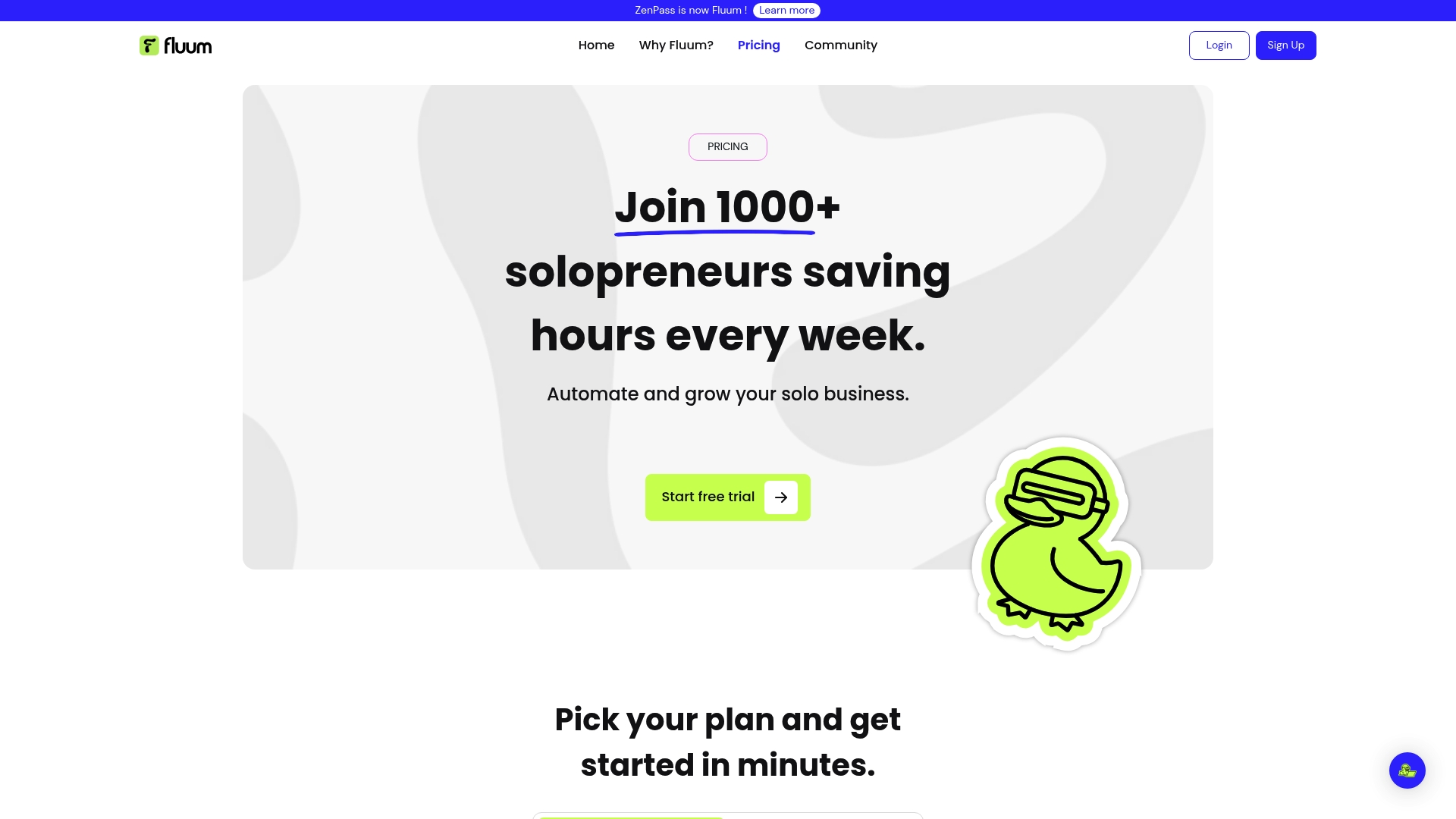
Running a business means the to-do list never ends, and self care for entrepreneurs often gets ignored. Yet studies show self-employed professionals face higher stress and burnout than traditional employees. Instead of hustling harder, building small daily self care for entrepreneurs habits can fuel focus, energy, and long-term success.
Table of Contents
- Establish A Daily Routine
- Prioritize Physical Health
- Set Boundaries For Work-Life Balance
- Practice Mindfulness And Meditation
- Invest In Continuous Learning
- Schedule Regular Breaks
- Connect With Other Entrepreneurs
- Seek Professional Support When Needed
Quick Summary
| Takeaway | Explanation |
|---|---|
| Establish a consistent daily routine | A structured routine enhances productivity and mental clarity, reducing stress during busy periods. |
| Prioritize physical health strategies | Regular exercise, a balanced diet, and adequate sleep are essential for sustained energy and resilience. |
| Set clear work-life boundaries | Defining professional limits protects personal time and reduces stress, enhancing overall well-being. |
| Practice mindfulness and meditation daily | These techniques improve focus, emotional intelligence, and resilience under pressure, fostering professional growth. |
| Invest in continuous learning opportunities | Engaging in courses, networking, and reading equips entrepreneurs with skills for adaptation and competitive advantage. |
1: Establish a Daily Routine
Self care for entrepreneurs starts with a daily routine that supports both performance and well-being. Smart founders know that structure isn’t limiting — it’s the key to productivity and mental clarity.
According to research in the International Journal of Environmental Research and Public Health, establishing consistent daily routines acts as a protective mechanism for mental health during high-stress periods. This means designing a framework that balances work responsibilities with personal restoration.
Your daily routine should incorporate several key elements that support holistic entrepreneurial wellness:
Morning preparation: Set aside time for mindful activities like meditation, journaling, or light exercise
Work segmentation: Create clear boundaries between professional tasks and personal time
Regular breaks: Schedule short intervals for mental reset and physical movement
Evening wind-down: Develop a consistent routine that signals the end of the workday and promotes relaxation
The goal isn’t rigid perfection but a flexible structure. Some days will deviate from your plan, and that’s okay. What matters is building a framework that eases decision fatigue and supports self care for entrepreneurs.
Align your routine with your natural energy. If mornings fuel your focus, tackle demanding tasks then. If evenings work better, adjust accordingly. A routine that honors your rhythms creates sustainable self care for entrepreneurs and keeps you performing at your best.
2: Prioritize Physical Health
Entrepreneurs often underestimate the critical role physical health plays in professional success. Working long hours and experiencing high stress levels can quickly lead to burnout without intentional physical wellness strategies.
According to research published in the Journal of Occupational and Environmental Medicine, entrepreneurs who maintain regular physical exercise and social connections report significantly better health outcomes. Physical activity is not just about fitness but about sustaining the energy and mental resilience required for business growth.
Effective physical health strategies for entrepreneurs include:
Regular exercise: Minimum 30 minutes of moderate activity daily
Nutrition planning: Balanced diet with adequate protein, complex carbohydrates, and essential nutrients
Sleep management: Consistent 7-8 hours of quality sleep
Stress reduction: Incorporate activities like walking, yoga, or meditation
Workplace ergonomics are a core part of self care for entrepreneurs. A supportive chair, good posture, and an ergonomic setup reduce strain and protect long-term health.
Hydration is another cornerstone of self care for entrepreneurs. Aim for at least 8 glasses of water a day, and limit caffeine and alcohol to sustain energy and focus. Small daily habits outweigh occasional extreme fixes.
Preventive health check-ups also belong to self care for entrepreneurs. Annual exams, dental cleanings, and vision tests help you stay proactive, keeping your body — your most valuable business asset — strong for the long run.
3: Set Boundaries for Work-Life Balance
Entrepreneurs frequently struggle with blurred lines between professional responsibilities and personal life. Establishing clear boundaries is not just recommended but essential for sustainable success and personal well-being.
According to research published in the International Journal of Environmental Research and Public Health, implementing strong work-life boundaries significantly reduces stress and improves overall mental health for self-employed professionals.
Key boundary-setting strategies include:
Digital detox: Establish specific times to disconnect from work communications
Physical workspace separation: Create a dedicated work area that can be closed off after work hours
Communication limits: Set clear expectations with clients about response times and availability
Non-negotiable personal time: Block personal activities in your calendar with the same importance as work commitments
Practical implementation requires conscious effort and consistent practice. Learn to say no to projects or requests that encroach on your personal time or do not align with your core business objectives. Learn more about setting energetic boundaries to understand the deeper psychological aspects of maintaining professional limits.
Technology can support self care for entrepreneurs when used wisely. Productivity tools, auto-responses, and time-tracking apps help you set boundaries and avoid overworking.
Boundaries are not about being unavailable — they’re about being strategically present. Protecting your energy and preventing burnout are key elements of self care for entrepreneurs, ensuring better performance and satisfaction.
Strong boundaries also signal maturity and self-respect. They remind clients and yourself that your time and well-being matter, making them a vital part of sustainable self care for entrepreneurs.
4: Practice Mindfulness and Meditation
Entrepreneurs operate in high-stress environments that demand constant mental agility and emotional resilience. Mindfulness and meditation emerge as powerful tools for maintaining psychological balance and enhancing cognitive performance.
According to research published in the International Journal of Environmental Research and Public Health, mindfulness meditation significantly reduces stress, anxiety, and depression while improving overall psychological well-being for working professionals.
Essential meditation practices for entrepreneurs include:
Breathing exercises: 5-10 minutes of focused deep breathing daily
Body scan meditation: Systematic awareness of physical sensations
Guided visualization: Mental rehearsal of successful business scenarios
Gratitude meditation: Reflection on positive business and personal experiences
Learn more about meditation techniques that can transform your entrepreneurial mindset and emotional regulation. Regular practice helps develop mental flexibility and reduces reactive decision-making.
Consistent meditation is a cornerstone of self care for entrepreneurs. It sharpens focus, builds emotional intelligence, and helps manage stress so you can handle complex challenges with clarity.
Start small — even 5–10 minutes daily matters. Apps, guided meditations, or virtual groups can support accountability and make self care for entrepreneurs easier to maintain.
Mindfulness isn’t about perfection; it’s about awareness and consistency. Treat it like skill-building, and you’ll discover how meditation fuels sustainable self care for entrepreneurs and long-term business growth.
5: Invest in Continuous Learning
Entrepreneurs who prioritize continuous learning create a sustainable pathway for personal growth and professional adaptation. Learning is not a luxury but a critical business strategy that enables professionals to stay competitive in rapidly evolving markets.
According to research in the Journal of the Royal Society of Medicine, continuous professional development significantly enhances individual skills, knowledge, and resilience.
Effective learning strategies for entrepreneurs include:
Online courses: Platforms offering specialized business and skill development training
Industry conferences: Networking and knowledge exchange opportunities
Professional podcasts: Regular insights from industry experts
Skill-specific workshops: Targeted learning experiences in key business domains
Reading is a powerful form of self care for entrepreneurs, fueling both personal growth and business success. Diversify your materials across business, psychology, technology, and personal development to keep your perspective sharp.
Digital platforms, webinars, and micro-learning make continuous education more accessible than ever. Building these habits into your routine reinforces self care for entrepreneurs, helping you stay adaptable and resilient.
A growth mindset is the ultimate learning strategy. By staying curious and turning knowledge into action, you transform challenges into opportunities. Lifelong learning isn’t just about skills — it’s a core pillar of sustainable self care for entrepreneurs.
6: Schedule Regular Breaks
Contrary to popular entrepreneurial mythology, working nonstop is not a badge of honor but a recipe for burnout. Strategic breaks are not productivity killers but essential performance enhancers that restore mental clarity and sustain long-term business effectiveness.
According to research from the University of Michigan’s Center for Entrepreneurship, intentional time-blocking that includes regular breaks significantly improves overall professional performance and personal well-being.
Effective break strategies include:
Pomodoro Technique: 25 minutes of focused work followed by 5-minute breaks
Physical movement: Short walks or stretching between work sessions
Mindful disconnection: Complete digital detox during breaks
Alternate work environments: Change physical spaces to stimulate creativity
Break quality matters more than quantity, and smart self care for entrepreneurs means using pauses to truly recharge. Swap passive scrolling for light exercise, meditation, or creative activities that restore mental energy.
Technology can also support self care for entrepreneurs by reminding you to step away. Use timers, apps, or calendar blocks to schedule breaks with the same importance as meetings.
Remember, breaks aren’t indulgences — they’re strategic. Treating them as part of self care for entrepreneurs prevents fatigue, sharpens focus, and fuels long-term innovation.
7: Connect with Other Entrepreneurs
Entrepreneurship can be an isolating journey, making professional connections crucial for mental resilience and business growth. Building a supportive network transforms individual struggles into collective learning opportunities.
According to research published in Frontiers in Psychology, peer networks among entrepreneurs are linked to reduced stress levels and more sustainable business practices.
Strategic networking approaches include:
Local entrepreneurial meetups: In-person and virtual professional gatherings
Industry-specific online communities: Targeted discussion forums and groups
Mastermind groups: Structured peer support and accountability networks
Professional social media platforms: LinkedIn and specialized entrepreneur networks
Explore community chat tools for connecting with fellow entrepreneurs to expand your professional support system effectively.
Quality matters more than quantity in professional connections. Focus on building meaningful relationships with entrepreneurs who share similar values, challenges, and growth mindsets. Seek connections that offer mutual learning, honest feedback, and potential collaboration opportunities.
Remember that networking is not about immediate transactional benefits but long-term relationship building. Approach interactions with genuine curiosity, offer support without expecting immediate returns, and demonstrate a willingness to share knowledge and resources.
Consider diversifying your network beyond your immediate industry. Cross-sector connections can provide fresh perspectives, unexpected insights, and innovative problem-solving approaches. Entrepreneurs who cultivate diverse networks often discover more creative solutions and unexpected business opportunities.
Think of your professional network as a living ecosystem that requires consistent nurturing. Regular communication, genuine interest in others’ success, and a spirit of collaborative growth will transform casual connections into powerful professional relationships.
8: Seek Professional Support When Needed
Entrepreneurs often view seeking professional support as a sign of weakness, when in reality, it represents strategic self-care and emotional intelligence. Recognizing when you need external guidance is a powerful indicator of professional maturity and personal growth.
According to research published in the International Journal of Environmental Research and Public Health, professional mental health support is crucial for entrepreneurs experiencing high-stress environments, helping to prevent burnout and maintain psychological well-being.
Types of professional support entrepreneurs might consider:
Business coaching: Strategic guidance for professional development
Mental health therapy: Psychological support and stress management
Career counseling: Career trajectory and professional goal alignment
Financial advisors: Professional financial planning and strategy
Professional support goes beyond problem-solving. It provides objective perspectives, helps develop coping strategies, and offers a confidential space to process complex professional challenges. The goal is not to fix something broken but to optimize your personal and professional potential.
Do not wait for a crisis to seek support. Regular check-ins with professionals can help identify potential challenges before they become significant obstacles. Consider support as a proactive investment in your entrepreneurial journey, similar to how you invest in business tools or marketing strategies.
Remember that vulnerability is not weakness. Top performers across industries recognize the value of external perspectives and professional guidance. By seeking support, you demonstrate commitment to continuous personal and professional growth.
Every entrepreneur’s support needs are unique. Be open to exploring different types of professional support, and do not hesitate to change professionals if the current approach is not serving your specific needs. Your mental health and professional success are worth the investment.
Below is a comprehensive table summarizing the eight essential self care tips for entrepreneurs, including key actions and benefits highlighted throughout the article.
| Self Care Tip | Key Actions/Strategies | Main Benefits |
|---|---|---|
| Establish a Daily Routine | Set structured daily schedule; incorporate morning prep, breaks, and wind-down routines | Enhances productivity, mental clarity, and reduces decision fatigue |
| Prioritize Physical Health | Maintain regular exercise, balanced nutrition, adequate sleep, and hydration; ergonomic workspace | Sustains energy, boosts resilience, and prevents burnout |
| Set Boundaries for Work-Life Balance | Define work hours, create workspace separation, limit digital communication, schedule personal time | Reduces stress and supports sustainable personal well-being |
| Practice Mindfulness & Meditation | Implement daily meditation, breathing exercises, body scans, and gratitude practice | Improves focus, emotional intelligence, and stress management |
| Invest in Continuous Learning | Take courses, attend conferences, read regularly, utilize industry resources | Increases adaptability, skills, and gives a competitive advantage |
| Schedule Regular Breaks | Use Pomodoro Technique, move physically, disconnect from screens, switch environments | Restores mental energy and supports innovative thinking |
| Connect with Other Entrepreneurs | Join meetups, mastermind groups, and online communities, build diverse networks | Alleviates isolation, fosters learning and idea-sharing |
| Seek Professional Support When Needed | Engage with coaches, therapists, counselors, or advisors as needed | Offers objective guidance, prevents burnout, and builds resilience |
Transform Your Self Care Into Lasting Business Success
Entrepreneurial self care is not just about routines and boundaries. It is also about giving yourself the right support to protect your time, energy, and growth. If you are tired of juggling endless admin and feeling stretched by client management, sales funnel building, and daily tech hassles, you are not alone. Many solopreneurs share the pain of burnout and lack of work-life balance described in this article. The desire for more structure, holistic wellness, and mental clarity demands smart solutions—especially those that help you set boundaries, automate routine tasks, and reclaim your focus.

Imagine having an AI-powered co-founder working for you day and night. With Fluum’s all-in-one platform, you can automate bookings, payments, marketing, and client communication, all while keeping personal time untouched. By streamlining business operations, Fluum enables you to finally create the daily structure, physical health routines, and mental space discussed in our self care tips. See how other service providers are scaling with less stress and start protecting your well-being. Explore your options now at https://fluum.ai/pricing and take your first step towards a sustainable, healthier business journey.
Frequently Asked Questions
What are some effective self-care strategies for entrepreneurs?
Establishing a daily routine, prioritizing physical health, setting work-life boundaries, practicing mindfulness, investing in continuous learning, scheduling regular breaks, connecting with other entrepreneurs, and seeking professional support are all essential self-care strategies for entrepreneurs.
How can I set boundaries for a better work-life balance?
To set boundaries, establish clear working hours, create a dedicated workspace, limit digital communication during personal time, and prioritize personal activities in your calendar just like work commitments.
Why is mindfulness important for entrepreneurs?
Mindfulness improves mental clarity, emotional resilience, and stress management, helping entrepreneurs navigate the challenges of running a business while maintaining overall psychological well-being.
How can I incorporate physical health into my daily routine?
Incorporate regular exercise, plan balanced meals, ensure adequate sleep, and adopt strategies for stress reduction, such as yoga or walking, to support your physical health as an entrepreneur.



